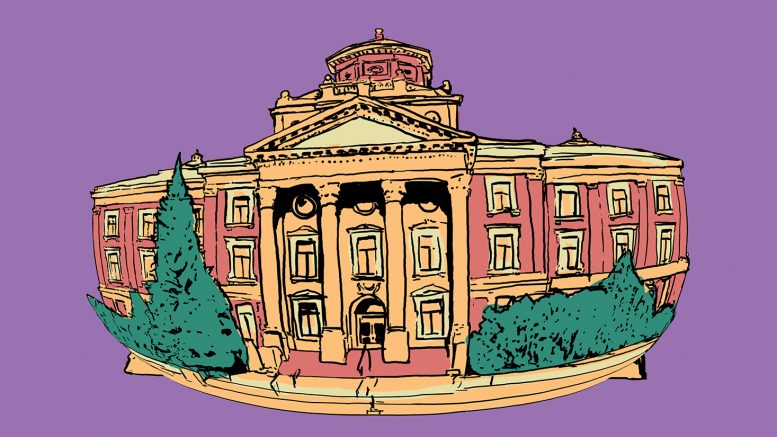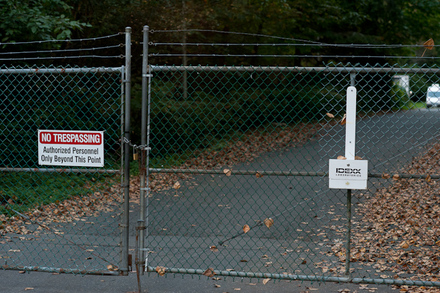With the elimination of the Tuition Fee Income Tax Rebate, de facto reductions in operating grants for post-secondary institutions, and the relaxing of tuition cap, the Progressive Conservative Party has held fast to its antiquated, slash-and-burn austerity model of budgeting. They have made a strong commitment to balancing the budget on the backs of overburdened students. Students need to join together and oppose these policies; in so doing, we need to go beyond simply demanding the status quo.
We need a radically different alternative to the current model of funding for post-secondary education.
It is not enough to make flimsy, milquetoast appeals for restraint and discretion in funding allocations. In the face of rising tuition and diminishing funding, we need to demand a renewal of public investment in post-secondary education in both our province and our country. We need to demand the absolute abolition of tuition and a progressive funding model to ensure that all people have access to a high quality post-secondary education.
Funding Cut, Students Squeezed
Education has not been exempt from the neoliberalization of our society – the concerted effort to implement the logic of the market and roll back government responsibility for funding social services. This process places the financial burden of attending a post-secondary institute directly on the shoulders of individual students.
Tuition fees have been increasing rapidly since the 1990s. Between 2000-01 and 2014-15, tuition revenues tripled, from $3.05 billion to $9.16 billion nationally. While tuition revenues were skyrocketing, government funding for universities was dropping.
In 1992, government funding made up 77.4 per cent of university operating revenues, while tuition fees made up 19.7 per cent. By 2012, government funding only accounted for 54.9 per cent of university revenue, while tuition fees made up 37.5 per cent.
For context, the average for the Organization for Economic Co-operation and Development is 70 per cent government funding for universities. These increases have coincided with increasing public student loan debt, ballooning from $20 billion in 1999 to $28 billion in 2012. This doesn’t even account for private loans, such as lines of credit or credit card debt. In Manitoba, students are graduating with an average of $25,000 in student debt.
How can students be expected to start their independent and professional lives when we bear such a heavy debt burden? Purchasing a house is often considered to be the mark of independence but as of 2011, 42 per cent of 20- to 29-year-olds in Canada lived in their parents’ homes, a dramatic increase from 1981 when only 27 per cent lived with their parents. Poor economic outlooks are already a huge pressure on our generation, and being squeezed by increasing tuition only exacerbates the problem. Decreasing funding for universities and increasing tuition is increasingly putting students in precarious financial straits.
Another World is Possible
Providing universal post-secondary education is entirely possible in the current economic climate. A report released this year by the Canadian Centre for Policy Alternatives (CCPA) proposed a series of post-secondary education reforms that would make it possible to provide quality, universal post-secondary education with an increase of only $10.5 billion annually in federal spending.
Part of this funding would come from savings from the elimination of current federal programs: tax credits, grants, and miscellaneous student aid – rendered irrelevant with the elimination of tuition fees. CCPA also proposes the introduction of a more progressive taxation program.
To put this in perspective, the Liberal government is moving forward with a plan to purchase new fighter jets at an estimated cost of $6.3 billion. If we can find the money to make war, we can find the money to make everyone’s lives better.
Who Benefits from Free Stuff?
The argument is sometimes made that universal access programs serve to subsidize the rich. The thinking goes that if free healthcare or education is provided to all, then it will be everyone’s tax dollars paying for the wealthy elite to access these services. This argument is misguided at best, and disingenuous and harmful at worst.
With a progressive system of taxation, the wealthy should, theoretically, pay a greater share of their income in taxes, to be redistributed through the funding of social programs such as health and education.
In a 2016 report, the Parliamentary Budget Officer found that “higher income families benefit disproportionately from non-refundable tax credits.” The people benefitting the most from government aid programs are the ones who need it least. If the current funding model is already benefitting the wealthier members of our society, why not adopt a model that benefits the least wealthy as well?
Dream Big, Be Bold, Break the Consensus
Neoliberal economic orthodoxies that have underpinned the platforms of all federal governments for over thirty years hold that funding for post-secondary education should come from tuition fees and private investment instead of public investment.
The assumption is that post-secondary education is simply a means to ready us for the job market – that we should consider it a down-payment on our future. This leads us to believe that universal post-secondary education is impossible, impractical, and not the responsibility of the government
These ideas are used to justify the exclusion of people from access to education on the basis of their ability to pay. I call on my fellow students to reject this narrative. Universal post-secondary education isn’t just a socialist pipe-dream: it is entirely feasible.
We must push back against the brutal, neoliberal logic of the market and demand a renewal in post-secondary education funding. We need to demand reinvestment in the youth of our country to ensure a prosperous economic outlook for ourselves, to not be deprived of the opportunities our parents had.
In the face of increasing inequality in our society, in which two men control as much wealth as the poorest 30 per cent of the country, we need to push for policies that encourage equality. If we truly desire a just and equal society, we must make education accessible to all those who wish to access it.
The struggle will not be easy. We are facing a grim policy agenda from our provincial government, but in the face of crushing austerity and a depressing outlook we must have the courage to propose a new vision, one of radical equality, in which there are no economic barriers to quality post-secondary education.
We must go beyond the status quo. We need to abolish tuition fees now.





